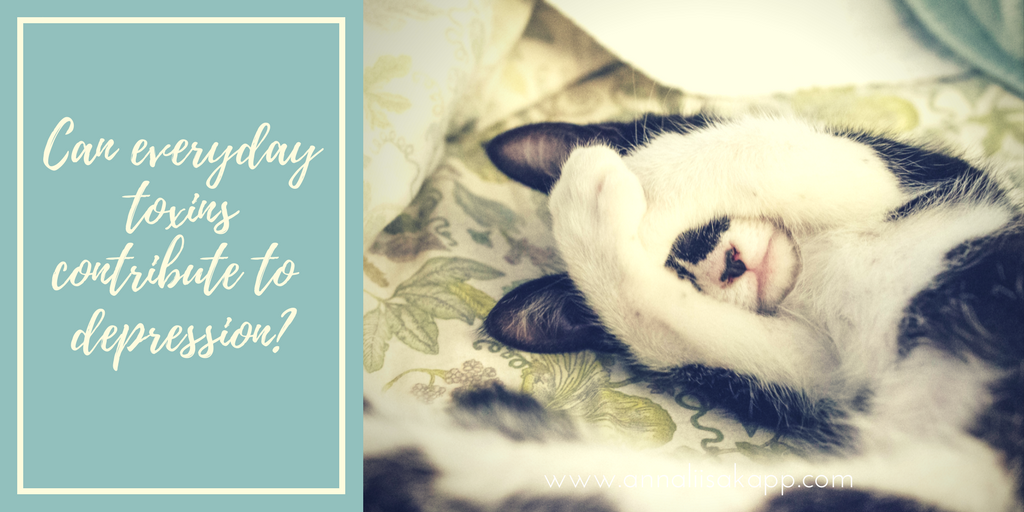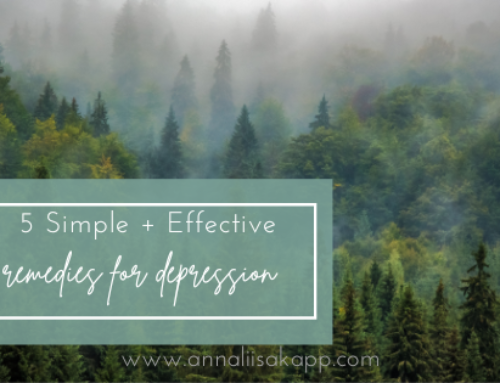
Are toxins contributing to your depression?
Depression affects 1 out of every 5 women and 1 out of every 10 men. Statistically, this is staggering! For many, depression can become a major obstacle in daily living, negatively impacting family life, work, relationships, and self worth.
The question we find ourselves asking is; “Why are so many people depressed?”. There is usually no one single cause for depression, but rather often a number of factors that can contribute to this disturbance in mood. A frequently overlooked factor that can be linked to the symptoms of depression is toxins. Let’s take a closer look at toxins and learn how they could potentially increase the risk for depression.
What are toxins and where do they come from?
A toxin is any substance that causes harmful effects to your body. We are exposed to toxins on a daily basis, externally from things like pollution, second hand smoke, pesticides, molds, heavy metals, medications, the foods we eat, household cleaning products, laundry detergent, self care products like skin care lotions and makeup, deodorants/antiperspirants, and internally from sources like bad bacteria, candida, chronic viral infections, stress, anxiety, and negative thinking. Yes, it’s true, even our thoughts can be toxic! All of these elements add to the body’s total toxic load.
Normally our lungs, kidneys, digestive tract, and most importantly,our liver can remove toxins on a daily basis. However when the body is overwhelmed by toxins, our organs cannot keep up with the amount of toxins, and the toxins then begin to accumulate in our fat cells. When toxins remain stored in the body for years, and toxic levels have become too high, we begin to see inflammation, build up of free radicals and acidity in the body, ultimately triggering illness and disease.
What are neurotoxins and how do they contribute to depression?
Neurotoxins are a category of toxins that affect the central and peripheral nervous systems. The central nervous system is comprised of the brain and spinal cord. The peripheral nervous system refers to the nerves and axons that carry signals outside of the brain and spinal cord. So, essentially neurotoxins negatively affect brain activity.
This is important!
Why? Because the brain needs to be functioning optimally, specifically producing an adequate balance of neurotransmitters, to prevent the occurrence of conditions like depression. As a result, avoiding neurotoxins is essential for optimal brain health, and therefore could play a role in the prevention and treatment of depression!
Common neurotoxins linked to depression
Pesticides
Pesticides, especially, organophosphates which are known for their effects on the nervous system.
Action step: Buy organic fruits and vegetables as conventionally grown fruits and vegetables are sprayed with pesticides like organophosphates. When shopping for produce, use the Environmental Working Group’s Shopper’s Guide. Avoid using toxic pesticides in your home and yard.
Heavy Metals like Lead, Mercury, Aluminum
Heavy metal exposure is linked to depression. Lead-based paint, leaded gasoline, lead-contaminated water, manufacturing of lead batteries, and lead oxide fumes that result when demolishing industrial buildings, mercury dental fillings, mercury tainted fish, aluminum foil, over the counter antacids and vaccines.
Action step: Start to pay attention to your living environment – are there simple adjustments you can make today? For example, don’t cook in aluminum foil and avoid drinks in aluminum cans.
Chronic Stress
Chronic stress is linked to depression in part because stress increases inflammation in the body, and brain inflammation has been noted in depressed patients. Chronic stress also increases cortisol levels in the body, high amounts of which is linked to depression, and decreases serotonin, a lack of which is a linked to depression. We are exposed to both environmental and internal stressors daily, so it’s up to us to take the time to make sure we have some stress relieving outlets, like writing a journal and taking walks daily. When our body is in a chronic state of stress, or ‘fight and flight mode’, we reduce our ability to remove toxins and heal the body.
Action step: If you have a lot of stress in your life, allow yourself to schedule in one stress relieving activity – for example a yoga class or a guided meditation at the end of your day. This allows your body to switch from sympathetic to parasympathetic nervous system to rest, digest, and heal.
Food derived neurotoxins
Processed food is known for containing high amounts of neurotoxic additives to make food taste good, and make you crave more. Be especially aware of hidden aspartame, monosodium glutamate, sucrolose, hydrolyzed vegetable protein, yeast extract and sodium caseinate.
Action step: Take the time to read labels in stores and get to know some trusted brands that don’t use preservatives, chemical additives and unnecessary sweeteners in their products.
What to do
Given all of the toxins we are often unknowingly exposing ourselves to on a daily basis, it’s no surprise that many people are living with toxic overload and its accompanying illnesses. If that may include you, don’t fret. Start with the basics, like drinking more water daily. Start to bring your awareness to what’s in your food and where it comes from. Connect with us today to start to implement other steps to strengthen and activate your detoxification pathways, and bring your body back to balance.
Written by our wonderful nutrition intern Dal Sumal.






